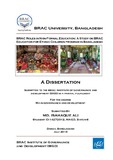| dc.contributor.advisor | Ahmed, Dr. Nasiruddin | |
| dc.contributor.author | Ali, Isahaque | |
| dc.date.accessioned | 2017-02-01T08:50:21Z | |
| dc.date.available | 2017-02-01T08:50:21Z | |
| dc.date.copyright | 2016 | |
| dc.date.issued | 2016-07 | |
| dc.identifier.other | ID 14272012 | |
| dc.identifier.uri | http://hdl.handle.net/10361/7721 | |
| dc.description | This dissertation is submitted in partial fulfillment of the requirements for the degree of MA in Governance and Development, 2016. | en_US |
| dc.description | Cataloged from PDF version of thesis report. | |
| dc.description | Includes bibliographical references (page 102 -107 ). | |
| dc.description.abstract | Education contributes significantly to socio-economic growth and development through human capital formation. NGOs like BRAC has taken crucial steps to raise literacy rate through non-formal education along with government efforts. Non-formal education for ethnic children provided by BRAC is a unique program to increase literacy rate of Adivasi population in Bangladesh. The study for this dissertation explores BRAC roles in promoting education for ethnic minorities in Bangladesh. Here the researcher applies a mixed method approach of social research where BRAC Education for Ethnic Children program is selected purposefully. Data is derived from BRAC field officials, EEC teachers, students and their guardians by using a set of questionnaire for officers and teachers, an interview schedule for guardians and focus group discussions with the students. Close observation is also employed in this study for better result. The findings show that BRAC plays pivotal roles to create opportunity for the ethnic children to access to basic education. About 94% of guardians and 96% of teachers are strongly agreed that BRAC Schools contribute positively a lot in education of tribal students in Bangladesh. Study also illustrates that sustaining quality of education and ensuring good governance in BRAC’s non-formal education is continuous efforts. BRAC field officials and teachers receive various kind of trainings related to governance and academic subjects of different grades and some special training to maintain teaching and education quality. Almost all group of respondents say that BRAC education has positive impact on their society. About 97% of guardians, 96% of teachers and 100% of POs think that people in the areas are more aware than before for BRAC school’s initiatives, which reduce or prevent early marriage in their regions. The findings lead to some recommendations which will give insights to policy makers and professionals engaged in this field. | en_US |
| dc.description.statementofresponsibility | Isahaque Ali | |
| dc.format.extent | 118 pages | |
| dc.language.iso | en | en_US |
| dc.publisher | BRAC University | en_US |
| dc.rights | BRAC University dissertation are protected by copyright. They may be viewed from this source for any purpose, but reproduction or distribution in any format is prohibited without written permission. | |
| dc.subject | Non-formal education | en_US |
| dc.subject | Ethnic children | en_US |
| dc.subject | MAGD | en_US |
| dc.title | BRAC roles in non-formal education: a study on BRAC education for ethnic children program in Bangladesh | en_US |
| dc.type | Thesis | en_US |
| dc.contributor.department | BRAC Institute of Governance and Development, BRAC University | |
| dc.description.degree | M. Governance and Development | |

